Brothers, listen to my story,
Sisters, listen to my song.
Gonna sing of four young people
Who are now dead and gone.
Two of them were twenty,
And two were just nineteen,
Just stepping out to meet the world
Like so many you have seen.
It was in Kent State, Ohio
On a Monday afternoon.
The air was full of springtime,
The flowers were in bloom.
It was a scene of terror
That none will soon forget.
Young students stood with empty hands
To face the bayonets.
Alli Krause and Sandy Scheuer
Marched and sang a peaceful song.
Like Bill Schroeder and Jeff Miller,
They did not think it wrong.
They laughed and joked with troopers,
And some to them did say:
We march to bring the GIs home,
And we are not afraid.
No warning were they given,
No mercy and no chance.
The air was filled with teargas,
The troopers did advance.
Suddenly they knelt and fired,
The students turned and fled.
Fifteen fell at that moment,
And four of them were dead.
On the campus they were murdered,
In the springtime of their lives.
As angry sorrow swept the land,
Their friends and parents cried.
They’d hardly learned to struggle,
But witness they will be.
They died for those in Vietnam,
Also for you and me.
But while we march and mourn today,
There's much more we must do.
We must teach ourselves to organize,
And see the struggle through.
Blood flowed upon the 4th of May,
And we'll know it's color well
'Til we sink this murdering system
In the darkest pits of hell.
Sisters, listen to my song.
Gonna sing of four young people
Who are now dead and gone.
Two of them were twenty,
And two were just nineteen,
Just stepping out to meet the world
Like so many you have seen.
It was in Kent State, Ohio
On a Monday afternoon.
The air was full of springtime,
The flowers were in bloom.
It was a scene of terror
That none will soon forget.
Young students stood with empty hands
To face the bayonets.
Alli Krause and Sandy Scheuer
Marched and sang a peaceful song.
Like Bill Schroeder and Jeff Miller,
They did not think it wrong.
They laughed and joked with troopers,
And some to them did say:
We march to bring the GIs home,
And we are not afraid.
No warning were they given,
No mercy and no chance.
The air was filled with teargas,
The troopers did advance.
Suddenly they knelt and fired,
The students turned and fled.
Fifteen fell at that moment,
And four of them were dead.
On the campus they were murdered,
In the springtime of their lives.
As angry sorrow swept the land,
Their friends and parents cried.
They’d hardly learned to struggle,
But witness they will be.
They died for those in Vietnam,
Also for you and me.
But while we march and mourn today,
There's much more we must do.
We must teach ourselves to organize,
And see the struggle through.
Blood flowed upon the 4th of May,
And we'll know it's color well
'Til we sink this murdering system
In the darkest pits of hell.
Contributed by Alessandro - 2010/3/17 - 13:04
×
![]()
Note for non-Italian users: Sorry, though the interface of this website is translated into English, most commentaries and biographies are in Italian and/or in other languages like French, German, Spanish, Russian etc.

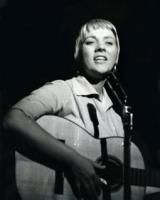

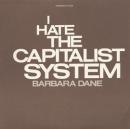
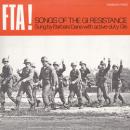
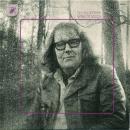

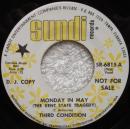
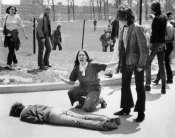
Words by Jack Warshaw and Barbara Dane.
Melody from The Death of Harry Simms (Aunt Molly Jackson).
Album “I Hate the Capitalist System”,
Paredon Records, 1973.
“The capitalist system, since its earliest days when little children were employed in the mills and sweatshops, has destroyed its young. In recent times it has demonstrated that it will not tolerate the most modest challenge to its power by murdering students during peaceful demonstrations on campuses.
There is a direct line of continuity from the murders at Orangeburg of Sam Hammon, 18, Delano Middleton, 17, and Henry Smith, 18, to the murders at Jackson State in Mississippi of Phillip Gibbs, 19 and James Green, 17, to the murders at Kent State, Ohio.
The line continues to the needless victimization of hundreds of thousands of their generation who were sent away to fight and die or come home maimed in body or spirit, or to become addicted to drugs in Southeast Asia or Watts and Harlem, Scarsdale and Des Moines.
I have been in Cuba and in China, and seen how enthusiastic and wholesome young people can be, even in 1973, when they are allowed a place in the building of a society, rather than converted into
a byproduct of the death of a system. It is possible to get some idea of what it will be like when we have pushed our society up onto the next stage of human development, but we won't see how it will work out in the full flowering genius of our own peoples until we get there. One thing for sure and certain: the young people will stop being victims and become the hope and joy of everyone in those new times to come.
This story is something of a parallel to the original The Death of Harry Simms in that he, too, was full of idealism and he, too, was murdered in the first flight of his young hopes. In the words of Aunt Molly Jackson, "Harry Simms was a young Jewish organizer who was murdered on Brush Creek, Knot County. He was walking along the railroad track with another fellow -- they were going down to meet some writers who came to study the conditions of the miners -- when the gun thugs shot him…" He was a young communist who volunteered to leave his home in New York and go to work with the miners during the bloody organizing drive, and lost his life to ruling class violence at the age of 19. The last line of his song is the same as the last line of this one, because it is the only way we will see an end to that kind of violence.”
(Nota introduttiva al brano dal libretto che accompagna l’album)